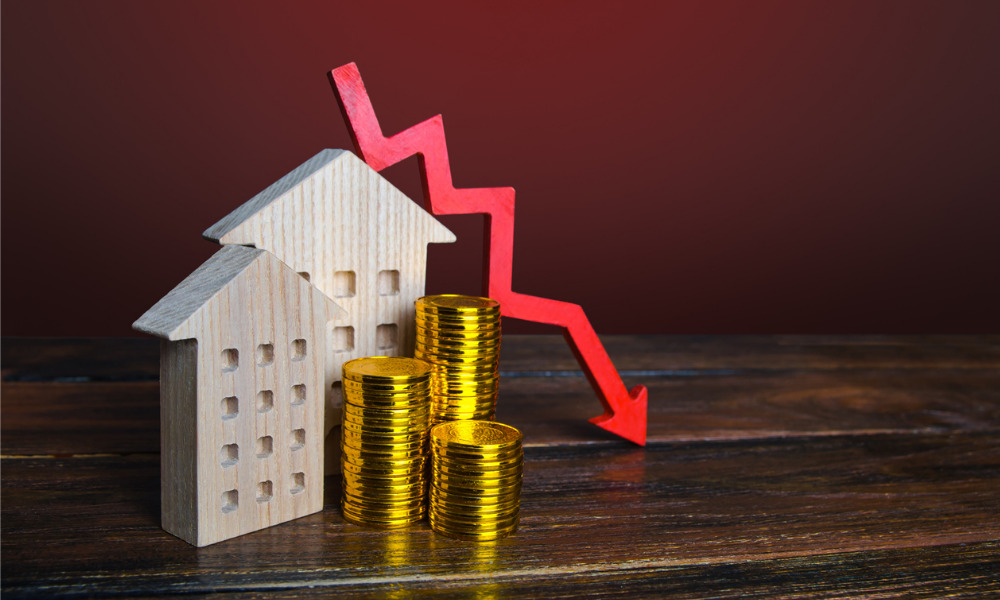Investors warned not to ignore 'paradigm shift'…but there's a glimmer of hope

Experts have warned about the impact of falling house prices on the mortgage sector following the latest rate hike by the Bank of England – the highest in 14 years.
The Nationwide’s HPI and the RICS Residential Market Survey – widely considered as barometers of the housing market – found that house prices had fallen for the first time in months.
According to the Nationwide, property prices experienced the biggest drop in October since February 2021, with average prices falling 0.4%, while RICS, which reported the views of estate agents across the UK, found that house prices declined for the first time in 28 months during the same period.
The Bank of England (BoE) raised the base interest rate by 75 bps - the highest single increase for 33 years - in a bid to reduce double-digit inflation, prompting a warning by the Nationwide’s chief finance officer that house prices could fall by as much as 30% next year.
Chris Rhodes told the Commons Treasury committee that this was a “worst case” scenario, although he also believed that in the best of cases, prices would slowly continue to increase.
“Those are the two extremes which are tail probabilities,” he said.
Read more: House prices start to fall, RICS survey finds
Nonetheless, prices are widely expected to fall between 10% and 15%, as borrowers face having to repay hundreds of pounds more in mortgage repayments over the coming months, particularly those on tracker rates.
With the downturn in the housing market, experts have been trying to gauge the medium-term impact on the sector.
Alex Hamilton, later life lending manager at Positive Lending, was asked by Mortgage Introducer whether he preferred seeing a fall in house prices, as it could help with affordability - rate rises notwithstanding - or whether the market as a whole would prefer to continue to see robust price growth.
“(The market) has to be stable, whether that means higher prices or lower prices,” he said.
“But if average earners can't afford to buy a house, that's where we're going to cause issues because we'd be living in ‘generation rent’, which wouldn't be a good thing for a broker.”
Scott Willson, chief executive of property valuation at Forbury, which provides commercial property modelling software, warned investors not to ignore plummeting house values, which he described as a “paradigm shift in market conditions”.
Quoted in a press report, he said: “Just because real estate is an inherently illiquid asset, it doesn’t mean plummeting values can be ignored.
“While this might offer the advantage of deferring some pain, it is vastly outweighed by the disadvantages of not responding to real-time price adjustments. It’s a well-established principle that what can’t be measured, can’t be managed, so investors can’t afford to ride out this paradigm shift in market conditions with their heads in the sand.”
Samuel Tombs, chief UK economist at Pantheon Macroeconomics, was quoted in the Daily Mail saying that the Nationwide’s latest findings provided the strongest signal yet that house prices “will buckle in the face of the surge in mortgage rates and the squeeze on real disposable incomes”.
Ian Mackie, real estate managing director in consulting firm BRG, said the rate rise would increase pressure on valuations and lead purchasers to seek “price adjustments”, including landlords, which would contribute to further market uncertainty.
Tom Bill, head of UK residential research at estate agent Knight Frank, meanwhile warned that demand would come under more pressure next year as a growing number of people came to the end of their fixed-rate deals.
Quoted in the Daily Mail, he nonetheless said low unemployment, a tight supply of homes and well-capitalised lenders would help to avoid the kind of double-digit falls that were seen during the financial crisis.
Read more: Nationwide lowers borrowing rates by up to 0.70%
Robert Gardner, Nationwide's chief economist, offered a glimmer of hope, telling Mortgage Introducer that the BoE’s recent trend of raising rates may have peaked.
“In terms of the rates that might matter most to the housing market, they are linked much more to longer term interest rates because most mortgage lending is two or five-year fixed rates, and they're linked much more to two and five-years swap rates.
“What we've seen in the last couple of weeks is that those rates have started to come down a little from the highs that we saw after the mini budget. Hopefully, that means that mortgage costs will also moderate through time.
“The other thing is around investor sentiment and their willingness to hold longer term UK assets. That has been improving, and as the political situation has started to settle, they’ll become more comfortable that the public finances are going to be put on a more stable trajectory. Those things are helping to lower longer term interest rates. Mortgage costs are not likely to fall back to the lows that we saw at the back end of last year, but hopefully we will continue to drift from the highest we've seen in the last month or so.”



